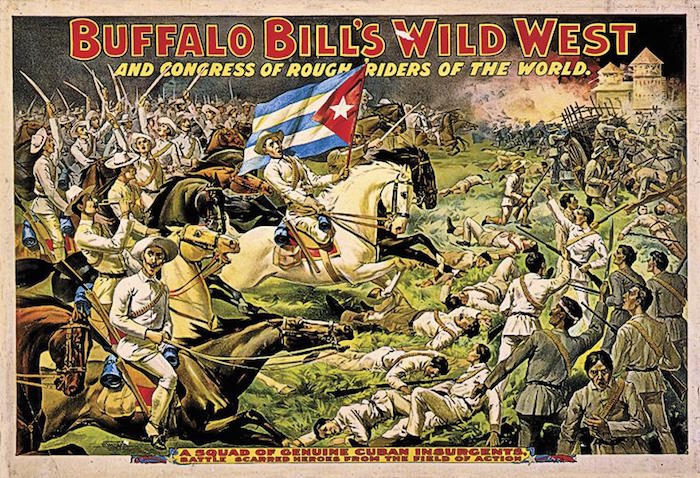By Jeffrey Wasserstrom (co-founder of UCI’s Forum for the Academy and the Public) for the Provocations series, in conjunction with UCI’s “The Future of Truth” conference
When Colonel William F. Cody, aka “Buffalo Bill,” died a century ago this week, the army scout turned Wild West Show star was still famous enough for newspapers published everywhere from Chicago and Shanghai to Berlin and Bombay to run his obituary. Even as far back as 1917, though, Cody and his show, known for its reenactments of frontier battles and displays of trick riding, already seemed outdated. And yet, when a book project led me to immerse myself in materials on Cody, something peculiar happened. I kept running across things that struck me not as throwbacks to the past but harbingers of things to come.
Cody was a boastful man who “continually leveraged events of his life to make himself more marketable,” according to Louis Warren, a leading historian of the Wild West Show. When he took the stage in the character of “Buffalo Bill,” the former frontiersman played a version of himself, much as hosts of reality TV shows do now. He was certainly a man of his time, but the way he blurred the line between real life and fabrication raises questions about truth and artifice that resonate eerily as Donald Trump’s inauguration draws nears.
Consider the way that some films based on true stories now end with photographs of the actual people actors have been portraying. Driven by a similar desire to make his dramas seem rooted in truth, Cody’s reenactments sometimes had casts that included people who had taken part in the actual battles of the past that he was presenting on stage. In the Wild West Show’s dramatization of the “Charge Up San Juan Hill,” while Cody played his famous friend Theodore Roosevelt, some of those riding to victory beside him on American stages had done the same thing in Cuba during the actual 1898 battle.
The Wild West Show could also, as “Hamilton” does now, become a lightning rod for political concerns. Consider what happened on April 2, 1901, when a new version of the show featuring a reenactment of a 1900 battle fought in China premiered at Madison Square Garden. Like the “Hamilton” performance that Vice President-elect Mike Pence attended in November, there was a famous man in the crowd that night, Mark Twain. The audience loved the show, but Twain disagreed with Buffalo Bill’s interpretation of the Boxer War. The next day, newspapers wrote that Twain walked out of the show in disgust, with an expression “as sour as a German pickle,” as one journalist put it. A leading voice in the anti-imperialist camp of the day, Twain viewed the anti-Christian Boxers as “patriots” fighting foreign encroachment on China, whereas Cody portrayed them as bloodthirsty fiends.
A final moment in Wild West Show history that seems curiously contemporary involves Theodore Roosevelt’s 1900 vice-presidential campaign. Roosevelt’s views on world affairs were diametrically opposed to Twain’s and in step with Cody’s. He ran as a muscular nationalist, giving jingoistic speeches that derided the Boxers and Tagalog rebels in the Philippines as savages.
He also ran as a celebrity. This was due to the fame he’d gained from his actual role in the Charge of San Juan Hill and the Wild West Show’s popular reenactment of that Spanish-American War battle, in which Cody himself played the future president.
At one point, according to Roosevelt, Buffalo Bill gave his political career a more direct boost. When the candidate’s travels took him to a town in which the Wild West Show was performing, Cody came to a rally and told his fans to vote for his friend T.R.
Buffalo Bill lived long before the era of social media, but the image of Cody stumping for a man he had played on stage feels strangely au courant. Ours is not the first era when lines between fact and fiction, between real and fake, have blurred in strange ways, even if in 1900 a boastful and jingoistic emcee merely helped a friend move toward the White House, rather than heading into it himself.
Provocations is a series produced in conjunction with “The Future of the Truth,” a UCI Forum for the Academy and the Public conference, staged in partnership with LARB, taking place in Irvine on February 3 and 4, 2017.


